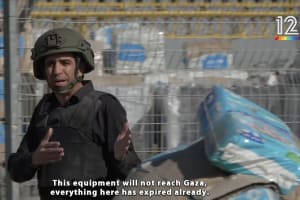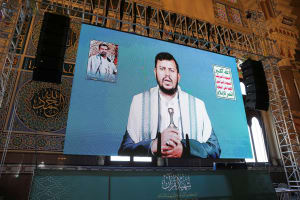Israeli capture of senior Hezbollah naval operative could impact war dynamic, Middle East expert assesses

The Middle East expert Amtazia Baram believes that the Israeli military’s recent capture of a senior Hezbollah terrorist in Lebanon could potentially change the war dynamic in a dramatic way.
On Friday night, Israeli commandos from the elite Shayetet 13 unit captured Imad Amhaz, a senior Hezbollah operative in the terrorist militia’s naval unit, in the northern Lebanese town Batroun. Amhaz was reportedly transferred to Israel for interrogation regarding Hezbollah’s naval activities.
Baram, professor emeritus at the Department of the History of the Middle East and Director of the Centre for Iraq Studies at the University of Haifa, believes the capture was a serious blow to Hezbollah’s military capabilities against Israel.
"They are trained and equipped by the Iranian Navy, known for its high professional standards. The small, fast vessels are designed for rapid raids along Israel's coastline, particularly targeting areas from Nahariya and Acre to even Haifa. Though such attacks have not yet materialized, the threat remains," Baram said in an interview with the Israeli news outlet Maariv.
He believes Amhaz's capture could potentially force the Iranian-backed terrorist group in Lebanon to adjust its war plans against Israel.
"They must decide whether to alter their operational plans and relocate bases or gamble that the detainee won't divulge critical information," Baram argued.
"The question remains where Hezbollah stores its equipment and what its future plans entail," he added.
"This arrest challenges Hezbollah's leadership, prompting a potential reassessment of their strategy. They may opt to shift base locations and develop contingency plans," he said.
The ongoing war between Hezbollah and Israel began on Oct. 8 last year when Hezbollah launched an unprovoked aerial attack on northern Israel. Hezbollah stressed its support for the terrorist organization Hamas, which one day earlier, had massacred 1,200 Israelis and kidnapped 251 people in southern Israel.
Over the past year, Hezbollah has launched more than 10,000 rockets, missiles and drones into Israel. Dozens of Israelis have been killed and some 60,000 Israelis have been displaced from their homes as a result of the attacks by Hezbollah forces in the Israel's northern region.
However, in September Israel launched a counter-offensive, eliminating most of Hezbollah’s top leadership including its elusive leader, Hassan Nasrallah. Furthermore, Israel also delivered serious blows to Hezbollah’s military capabilities by destroying most of the its missile and drone arsenal.
Israeli Defense Minister Yoav Gallant estimated in late October that Hezbollah maintained only 20% of its prewar missile arsenal.
“The achievements of the IDF in Lebanon are extremely impressive. We have eliminated the chain of command and control of Hezbollah, and I estimate the missile and rocket capability they have left is at 20%,” Gallant said.
Baram argued that "to secure a ceasefire on favorable terms, Israel must ensure the Lebanese Shi'ite population pressures their leaders to end hostilities."
"A psychological approach is necessary – deploying suitable messages to make civilians recognize that continuing the conflict is intolerable. Convincing this public that life under Hezbollah's rule is untenable could spark internal pressure," he added.

The All Israel News Staff is a team of journalists in Israel.













